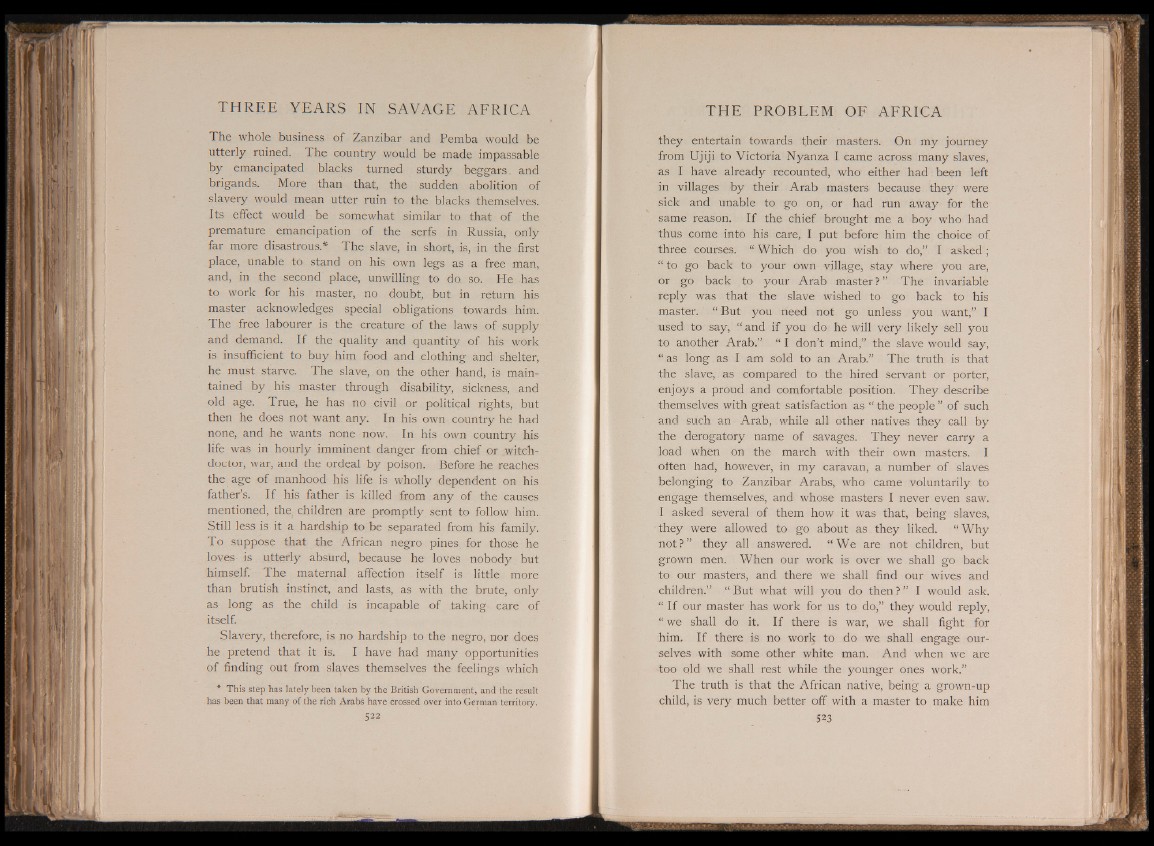
The whole business of Zanzibar and Pemba would be
utterly ruined. The country would be made impassable
by emancipated blacks turned sturdy beggars, and
brigands. More than that, the sudden abolition of
slavery would mean utter ruin to the blacks themselves.
Its effect would be somewhat similar to that of the
premature emancipation of the serfs in Russia, only
far more disastrous* The slave, in short, is, in the first
place, unable to stand on his own legs as a free man,
and, in the second place, unwilling to do so. He has
to work for his master, no doubt, but in return his
master acknowledges special obligations towards him.
The free labourer is the creature of the laws of supply
and demand. If the quality and quantity of his work
is insufficient to buy him food and clothing and shelter,
he must starve. The slave, on the other hand, is maintained
by his master through disability, sickness, and
old age. True, he has no civil or political rights, but
then he does not want any. In his own country he had
none, and he wants none now. In his own country his
life was in hourly imminent danger from chief or witchdoctor,
war, and the ordeal by poison. Before he reaches
the age of manhood his life is wholly dependent on his
father’s. If his father is killed from any of the causes
mentioned, the, children are promptly sent to follow him.
Still less is it a hardship to be separated from his family.
To suppose that the African negro pines for those he
loves is utterly absurd, because he loves nobody but
himself. The maternal affection itself is little more
than brutish instinct, and lasts, as with the brute, only
as long as the child is incapable of taking care of
itself.
Slavery, therefore, is no hardship to the negro, nor does
he pretend that it is. I have had many opportunities
of finding out from slaves themselves the feelings which
* This step has lately been taken by the British Government, and the result
has been that many of the rich Arabs have crossed over into German territory.
522
they entertain towards their masters. On my journey
from Ujiji to Victoria Nyanza I came across many slaves,
as I have already recounted, who either had been left
in villages by their Arab masters because they were
sick and unable to go on, or had run away for the
same reason. If the chief brought me a boy who had
thus come into his care, I put before him the choice of
three courses. | Which do you wish to do,” I asked;
“ to go back to your own village, stay where you are,
or go back to your Arab master?” The invariable
reply was that the slave wished to go back to his
master. “ But you need not go unless you want,” I
used to say, “ and if you do he will very likely sell you
to another Arab.” “ I don’t mind,” the slave would say,
“ as long as I am sold to an Arab.” The truth is that
the slave,. as compared to the hired servant or porter,
enjoys a proud and comfortable position. They describe
themselves with great satisfaction as “ the people ” of such
and such an Arab, while all other natives they call by
the derogatory name of savages. They never carry a
load when on the march with their own masters. I
often had, however, in my caravan, a number of slaves
belonging to Zanzibar Arabs, who came voluntarily to
engage themselves, and whose masters I never even saw.
I asked several of them how it was that, being slaves,
they were allowed to go about as they liked. “ Why
not?” they all answered. “ We are not children, but
grown men. When our work is over we shall go back
to our masters, and there we shall find our wives and
children.” “ But what will you do then ? ” I would ask.
“ If our master has work for us to do,” they would reply,
“ we shall do it. If there is war, we shall fight for
him. If there is no work to do we shall engage ourselves
with some other white man. And when we are
too old we shall rest while the younger ones work.”
The truth is that the African native, being a grown-up
child, is very much better off with a master to make him